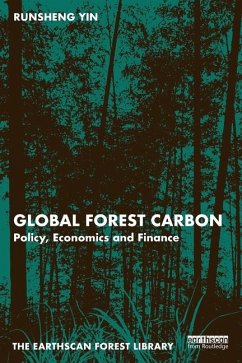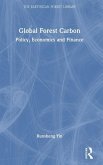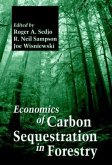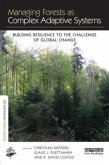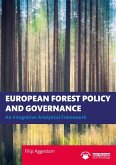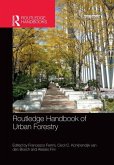This book addresses the major policy, economic and financial issues encountered in global forest carbon.
The global forest sector is expected to play a major role in achieving the Paris Agreement's temperature targets. Therefore, there is an urgent need to explore practical and promising solutions to the challenges facing carbon accounting and policy assessment as the global community undertakes forest sector actions-including the widely known REDD+ initiative. This book demonstrates how vital it is that we identify appropriate perspectives and formulate approaches to address these challenges in an integrated and effective manner. In doing so, it addresses many of the major issues, including the differential potentials for carbon sequestration within various forest ecosystems as well as for storage within a variety of harvested wood products, the joint production of timber and carbon, and the measurement and impact of forest carbon offsets and credits, results-based payments, and other nationally determined contributions centered differences as well. The book examines regional and country-level case studies from across the world and draws on the author's decades of experience working on forest policy and with the forest sector. Overall, this book highlights the technical and policy issues regarding forest sector carbon emission and removal to build useful perspectives, frameworks, and methods for addressing these issues successfully in the future. It advances the knowledge frontiers of global forest carbon policy, economics and finance as well as the ability to assess the effectiveness, efficiency, and equity of forest climate solutions.
This book is essential reading for professionals and policymakers working at the intersection of forest policy, carbon storage and climate change, as well as students and researchers in the fields of forestry, natural resource management, climate change and nature-based solutions.
The global forest sector is expected to play a major role in achieving the Paris Agreement's temperature targets. Therefore, there is an urgent need to explore practical and promising solutions to the challenges facing carbon accounting and policy assessment as the global community undertakes forest sector actions-including the widely known REDD+ initiative. This book demonstrates how vital it is that we identify appropriate perspectives and formulate approaches to address these challenges in an integrated and effective manner. In doing so, it addresses many of the major issues, including the differential potentials for carbon sequestration within various forest ecosystems as well as for storage within a variety of harvested wood products, the joint production of timber and carbon, and the measurement and impact of forest carbon offsets and credits, results-based payments, and other nationally determined contributions centered differences as well. The book examines regional and country-level case studies from across the world and draws on the author's decades of experience working on forest policy and with the forest sector. Overall, this book highlights the technical and policy issues regarding forest sector carbon emission and removal to build useful perspectives, frameworks, and methods for addressing these issues successfully in the future. It advances the knowledge frontiers of global forest carbon policy, economics and finance as well as the ability to assess the effectiveness, efficiency, and equity of forest climate solutions.
This book is essential reading for professionals and policymakers working at the intersection of forest policy, carbon storage and climate change, as well as students and researchers in the fields of forestry, natural resource management, climate change and nature-based solutions.
"Global Forest Carbon...is one of the first books that tackle issues of forest carbon policy, economics, and finance in a coherent, practical, and timely manner. I would recommend it to my students and colleagues as well as other scholars and policymakers who are interested in forest sector climate solutions."
Shilong Piao, Professor, Institute of Carbon Neutrality, Peking University
"Global Forest Carbon: Policy, Economics and Finance is an excellent resource on the role of forest sector in addressing climate change. The author uses analytical, critical, and comprehensive lens and global cases to present an exemplary synthesis of the processes, principles and practices for the reduction and removal of carbon emissions."
Shashi Kant, Professor, Institute for Management & Innovation, University of Toronto
"Empowering and enlightening! Global Forest Carbon...illuminates the complex links between carbon markets, sustainable finance, and forest conservation, providing a comprehensive view of forest carbon management. A persuasive read that equips readers to champion nature-centered climate remedies by fostering profound insight and capability in tackling the crucial challenges of policy implementation."
Wan-Yu Liu, Professor, Department of Forestry, National Chung Hsing University, Taiwan
"The questions Global Forest Carbon...addresses are key to inform sound forest sector policies in implementing the Paris Agreement, providing valuable insights on the complex topics of forest carbon economics and finance. It is a most welcome contribution to the ongoing efforts on climate change adaptation and mitigation."
Monica Gabay, Professor, National University of San Martin, Argentina; Division 9 Coordinator, International Union of Forest Research Organizations
Shilong Piao, Professor, Institute of Carbon Neutrality, Peking University
"Global Forest Carbon: Policy, Economics and Finance is an excellent resource on the role of forest sector in addressing climate change. The author uses analytical, critical, and comprehensive lens and global cases to present an exemplary synthesis of the processes, principles and practices for the reduction and removal of carbon emissions."
Shashi Kant, Professor, Institute for Management & Innovation, University of Toronto
"Empowering and enlightening! Global Forest Carbon...illuminates the complex links between carbon markets, sustainable finance, and forest conservation, providing a comprehensive view of forest carbon management. A persuasive read that equips readers to champion nature-centered climate remedies by fostering profound insight and capability in tackling the crucial challenges of policy implementation."
Wan-Yu Liu, Professor, Department of Forestry, National Chung Hsing University, Taiwan
"The questions Global Forest Carbon...addresses are key to inform sound forest sector policies in implementing the Paris Agreement, providing valuable insights on the complex topics of forest carbon economics and finance. It is a most welcome contribution to the ongoing efforts on climate change adaptation and mitigation."
Monica Gabay, Professor, National University of San Martin, Argentina; Division 9 Coordinator, International Union of Forest Research Organizations

